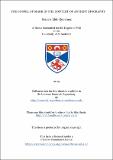Files in this item
The Gospel of Mark in the context of ancient biography
Item metadata
| dc.contributor.advisor | Wright, N. T. (Nicholas Thomas) | |
| dc.contributor.author | Rouvinez, Francis Aldo | |
| dc.coverage.spatial | x, 216 p. | en_US |
| dc.date.accessioned | 2019-04-04T15:07:41Z | |
| dc.date.available | 2019-04-04T15:07:41Z | |
| dc.date.issued | 2019-06-25 | |
| dc.identifier.uri | https://hdl.handle.net/10023/17453 | |
| dc.description.abstract | This thesis argues that the Gospel of Mark reflects the assumptions, purposes, and conventions of ancient Jewish biographical writing rather than those of Greco-Roman biography. It offers a sustained critique of the view that the gospels are Greco-Roman biographies and argues that it is based on an exaggeration of the flexibility of the genre, insufficient attention to its most fundamental and distinctive characteristics, and an inadequate evaluation of the significance of resemblances and differences. It also seeks to remedy the hereto lack of adequate assessment of and comparison to the manner in which life and career stories are told in ancient Jewish literary traditions. Chapter 1 offers a review of the conditions that have proved favourable to the emergence and endurance of the current consensus. Chapter 2 proposes a fresh analysis of Greco-Roman biography between 200 BCE and 100 CE. It gives close attention to the modes of representation of the genre, as well as its philosophical and cultural underpinnings, with relevant substantiation from the works of the main authors of the period. Chapters 3 and 4 bring to light the strong Jewish biographical tradition that exists both in the Jewish Scriptures and Second Temple literature. A typology of these biographies is proposed which delineates their conventions, topoi, and lines of development. An analysis of later Jewish adaptations to the cultural expectations of Greco-Roman audiences and the conventions of Greco-Roman biography is also included. Chapter 5 demonstrates that the ethos, narration, and style of Mark conform to those of Jewish biography. Finally, chapters 6, 7, and 8 evaluate leading interpretations of Mark’s introduction, main narrative, and Passion Narrative through the lens of Greco-Roman biography. Each of these chapters then demonstrates Mark’s use of modes of representation and categories of content typical of Jewish biography to present Jesus as the fusion of biblical prototypical figures and the embodiment of messianically-interpreted texts from the Jewish Scriptures. | en_US |
| dc.language.iso | en | en_US |
| dc.publisher | University of St Andrews | |
| dc.subject | Jesus Christ -- Biography -- History and criticism. | en_US |
| dc.subject | Greek literature -- History and criticism. | en_US |
| dc.subject | Biography as a literary form. | en_US |
| dc.subject | Religious biography -- History and criticism. | en_US |
| dc.subject | Greek literature -- Relation to the New Testament. | en_US |
| dc.subject | Greek literature, Hellenistic -- History and criticism. | en_US |
| dc.subject | Bible. N.T. Gospels. -- Criticism, interpretation, etc. | en_US |
| dc.subject | Bible. N.T. Gospels. -- Language, style. | en_US |
| dc.subject | Bible. N.T. Mark. -- Criticism, interpretation etc. | en_US |
| dc.subject | Bible. Mark -- Criticism, Narrative. | en_US |
| dc.subject | Bible. N.T. Mark -- Relation to the Old Testament. | en_US |
| dc.subject | Bible. O.T. -- Relation to Mark. | en_US |
| dc.subject | Jesus Christ -- Person and offices. | en_US |
| dc.subject | Bible. Old Testament -- Biography | en |
| dc.subject.lcsh | Bible. Mark--Criticism, interpretation, etc. | en |
| dc.subject.lcsh | Bible. Mark--Criticism, Narrative | en |
| dc.subject.lcsh | Bible. Mark--Relation to the Old Testament | en |
| dc.subject.lcsh | Bible. O. T.--Relation to Mark | en |
| dc.subject.lcsh | Jesus Christ--Biography--History and criticism | en |
| dc.subject.lcsh | Greek literature, Hellenistic--History and criticism | en |
| dc.subject.lcsh | Biography as a literary form | en |
| dc.subject.lcsh | Religious biography--History and criticism | en |
| dc.subject.lcsh | Greek literature--Relation to the New Testament | en |
| dc.subject.lcsh | Jesus Christ--Person and offices | en |
| dc.title | The Gospel of Mark in the context of ancient biography | en_US |
| dc.type | Thesis | en_US |
| dc.type.qualificationlevel | Doctoral | en_US |
| dc.type.qualificationname | PhD Doctor of Philosophy | en_US |
| dc.publisher.institution | The University of St Andrews | en_US |
| dc.publisher.department | School of Divinity | en_US |
| dc.identifier.doi | https://doi.org/10.17630/10023-17453 |
This item appears in the following Collection(s)
Items in the St Andrews Research Repository are protected by copyright, with all rights reserved, unless otherwise indicated.

